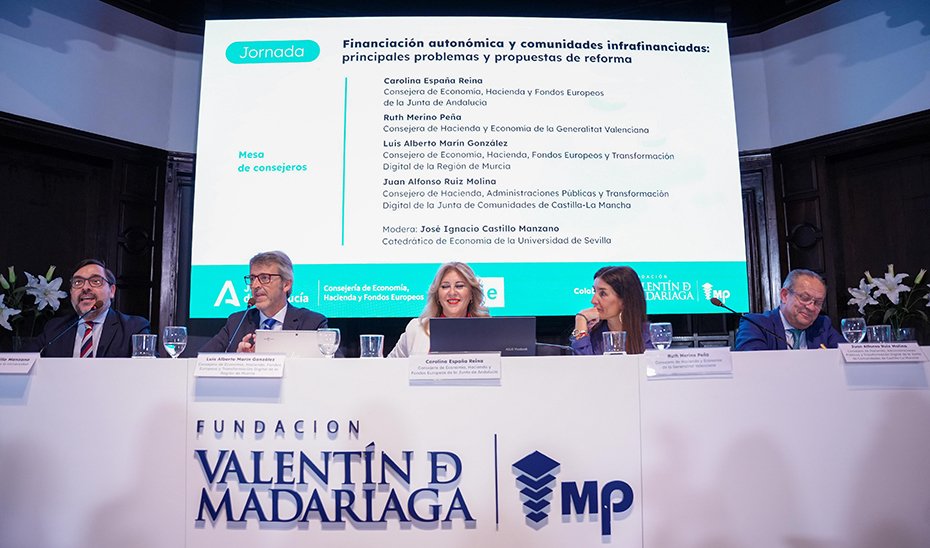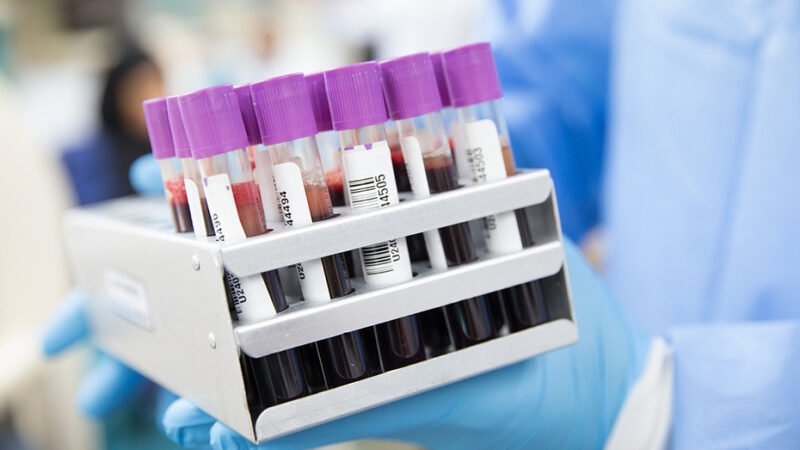Reforma urgente del Sistema de Financiación Autonómica para comunidades infrafinanciadas

The four communities aggrieved by the Autonomous Financing System (SFA), Andalusia, Valencia, Murcia, and Castilla-La Mancha, have demanded urgent and prioritized reform of the current model «to have a fairer and more equal one, that does not clip our wings and guarantees that any citizen, wherever they live, receives the same resources from the State,» as claimed by the Minister of Economy, Finance, and European Funds, Carolina Spain, who has revealed that, from 2009 until now, Andalusia should have received 13,411 million euros more.
During the inauguration of the ‘Autonomous financing and under-financed communities: main problems and reform proposals’ conference, organized by the Andalusian Government in collaboration with the Valencian Institute of Economic Research (Ivie) and with the support of Valencia, the Government of the Murcia Region, and Castilla-La Mancha, the minister has emphasized that the latest report from the Valencian institute on autonomous financing delves into the situation of the four participating communities by receiving less resources compared to the average. Additionally, she has indicated that «it confirms that the current system, agreed upon in 2009 by the Spanish Government with ERC and without the consensus of the rest of the communities, prevents us from growing as we would like.»
In this regard, the Ivie report highlights that the current system allows differences between autonomous communities of up to 1,000 euros per inhabitant adjusted per year. «For an autonomous government to be able to spend up to 1,000 euros more per citizen than another, just based on their residence data, is a clear attack on the Constitution, allowing privileges in access to public services based on the citizen’s address,» Spain warned.
Impact on the convergence of under-financed autonomous communities
The document prepared by the Valencian Institute of Economic Research considers that, for the past sixteen years, Andalusia should have received, at least, 13,411 million euros more. In the case of Valencia, it would be over 20,000 million, for Castilla-La Mancha, almost 2,000, and for the Murcia Region, over 4,000. It also points out that, in terms of convergence, during the validity of the current Autonomous Financing System, there are communities that have diverged up to nine points from the average.
Thus, Carolina Spain has highlighted the effort of the Andalusian Government to «advance in convergence despite the difficulties», in such a way that in terms of GDP per capita, Andalusia has progressed by almost one point in convergence with Spain, from 74.1% recorded in 2018, to 74.9% in 2022. On the contrary, the community lost 2.6 points of convergence, from 76.7% to 74.1%, in the previous decade (2008-2018).
«These data demonstrate that, with fair financing, Andalusia would not only be transforming as we are doing, but it would soar, but this Autonomous Financing System clips our wings and suffocates us,» she lamented.
In addition to under-financing, the Minister of Economy has recalled that the current system allocates fewer resources to all autonomous communities than what corresponds to their competencies and the investment required to exercise them, known as global insufficiency. «To meet our competencies, the State should have allocated at least 137,000 million euros more to the autonomous communities since 2008,» she detailed.
In this scenario, she has demanded that under-financed communities «we need a financing system without the flaws of the current one, both in terms of equity and sufficiency, that is, a system that does not harm some communities over others and that also has enough resources for all autonomous communities to exercise their competencies.» Likewise, she has urged «the implementation of a transitional equalization fund that immediately equalizes our financing to the average, while that system is reformed,» an aspect that some institutions like the Foundation for Applied Economic Studies (FEDEA) have estimated at around 3,000 million euros.
Therefore, she has censured that, instead of reforming the system, the Spanish Government prioritizes other financing proposals that only benefit certain territories at the expense of others: «Enough with grievances, enough with under-financing, and, of course, enough with privileges,» she concluded, to ensure that «from Andalusia, we will not allow any more blackmail from separatism, nor will we settle for deceit or any kind of fiscal whitewashing, just to appease agreements with the separatist partners of the Government.» «We do not want privileges for others or for ourselves, only what we deserve.»
The Finance ministers of the four communities have agreed that the lack of resources to guarantee quality essential public services in health, education, or social policies implies drawing funds from other chapters, which diminishes the capacity to implement other development policies or progress in convergence with the rest of Spain.
Spain has reflected on the under-financed communities: «We allocate higher percentages of our income to cover essential public services. When a household lacks money, expenses are first allocated to urgent needs, which in the case of autonomous communities are health, education, and social services. But if the money is limited, no matter how precisely we manage it, we are forced to allocate fewer resources to regional development policies, which ultimately hinders the growth of our GDP per capita and convergence,» she emphasized.

